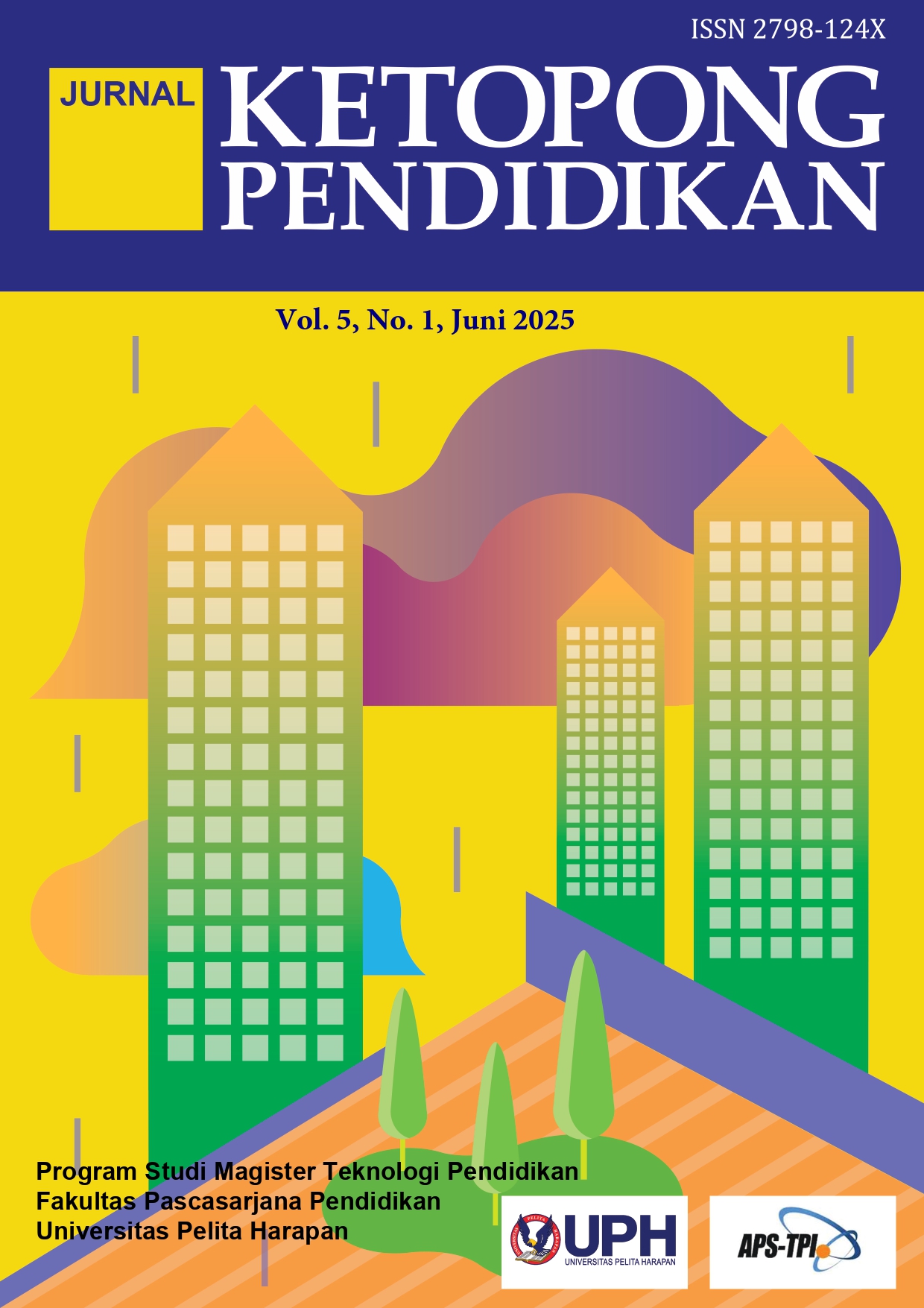Pengaruh Appraisal, Pengembangan Profesional, dan Kesehatan Mental terhadap Kinerja Guru di Sekolah Menengah Pertama XYZ Jakarta [The Influence of Appraisal, Professional Development, and Mental Health on Teacher Performance at XYZ Junior High School, Jakarta]
DOI:
https://doi.org/10.19166/jkp.v5i1.10178Schlagworte:
Appraisal, Pengembangan Profesional, Kesehatan Mental, Kinerja Guru , [Appraisal, Professional Development, Mental Health, Teacher Performance]Abstract
This study aims to determine the influence of appraisal, professional development, and mental health on teacher performance at SMP XYZ Jakarta. The results showed that all three variables have an influence on teacher performance, with mental health as the most dominant factor. The effect of appraisal on teacher performance has a coefficient of determination (R²) of 5.5%, indicating a small but influential contribution to improving performance. Professional development contributed 7.7% to teacher performance, indicating the importance of training and competency development programs. Meanwhile, mental health made the largest contribution with a coefficient of determination of 63.8%, confirming that teachers' mental well-being is an important factor in supporting optimal performance. Based on these findings, it is recommended that schools improve the effectiveness of the appraisal system, strengthen professional development programs, and pay more attention to the mental health aspect of teachers. These strategies are expected to significantly and sustainably improve teacher performance.
Literaturhinweise
Almurtadho, M. S., Aris, M. C., Shoima, H., Rachmawati, Y. (2021). Pengembangan profesi guru dalam meningkatkan kinerja guru. BASA: Journal of Language & Literature, 1(1), 26–34. https://doi.org/10.33474/basa.v1i1.10581
Alya, E. G., Firmansyah, Y., & Mukaram, M. (2022). Dampak kesehatan mental dan strategi coping terhadap kinerja karyawan PT Pindad Persero selama pandemi COVID-19 (studi kasus pada karyawan PT Pindad Persero). Formosa Journal of Science and Technology, 1(3), 165–174. https://doi.org/10.55927/fjst.v1i3.832
Braskamp, L. A., & Ory, J. (2021). Assessing teaching effectiveness: A practical guide (2nd ed.). Stylus Publishing, LLC.
Brown, K., Johnson, R., & Williams, A. (2023). Understanding the analysis of variance (ANOVA) test: Concepts and applications. Journal of Statistical Methods, 25(2), 56–73.
Firmansyah, D., & Dede, D. (2022). Teknik pengambilan sampel umum dalam metodologi penelitian: Literature review. Jurnal Ilmiah Pendidikan Holistik, 1(2), 85–114. https://doi.org/10.55927/jiph.v1i2.937
Garcia, C., & Martinez, D. (2023). The efficiency of closed-ended questionnaires in research: Ensuring data consistency. Journal of Quantitative Methods, 15(2), 80–95.
Handayani, R., Wahyuni, E., & Marjo, H. K. (2021). Gambaran tingkat literasi kesehatan mental pada peserta didik sekolah menengah pertama. Jurnal Ilmu Pendidikan Indonesia, 9(2), 79–85. https://doi.org/10.31957/jipi.v9i2.1717.
Hermawan, S., & Hariyanto, W. (2022). Buku ajar metode penelitian bisnis (kuantitatif dan kualitatif). Umsida Press.
Hirsh, S., & Rowland, K. (2023). A guide to professional development for educators: 101 tips, tricks, and ideas. Routledge.
Johnson, M. (2021). Analyzing data: Descriptive methods. Research Publishers.
Johnson, R., & Brown, M. (2022). Reliability analysis techniques in social sciences. Social Science Quarterly, 30(4), 112–128.
Munawir, M., Fitrianti, Y., & Anisa, E. N. (2022). Kinerja guru profesional sekolah dasar. JPG: Jurnal Pendidikan Guru, 3(1), 8–14. https://doi.org/10.32832/jpg.v3i1.6251.
Nurfatimah, S. A., Hasna, S., & Rostika, D. (2022). Membangun kualitas pendidikan di indonesia dalam mewujudkan program sustainable development goals (SDGs). Jurnal Basicedu, 6(4), 6145–6154. https://doi.org/10.31004/basicedu.v6i4.3183
Otnie, B. M., Sitompul, R. S., Sihombing, D. R. W., & Damanik, J. B. (2021). Pengaruh kesehatan mental terhadap kinerja pegawai pada dinas kesehatan Kabupaten Tapanuli Utara. Jurnal Global Manajemen, 10(2), 8–13. https://doi.org/10.46930/global.v10i2.1329.
Peng, J. (2022). Performance appraisal system and its optimization method for enterprise management employees based on the KPI index. Discrete Dynamics in Nature and Society, 1(1), 1–12. https://doi.org/10.1155/2022/1937083.
Risdiantoro, R. (2021). Pengaruh pelatihan guru terhadap kinerja guru melalui pengembangan profesional guru Madrasah Ibtidaiyah Se-Kota Batu. Khidmatuna: Jurnal Penelitian Dan Pengabdian Kepada Masyarakat, 2(1), 144–157. https://doi.org/10.51339/khidmatuna.v2i1.184.
Rudianto, Z. N. (2022). Pengetahuan generasi Z tentang literasi kesehatan dan kesadaran mental di masa pandemi. Jurnal Pendidikan Kesehatan, 11(1), 57–72. https://doi.org/10.31290/jpk.v11i1.2843
Skaalvik, E. M., & Skaalvik, S. (2022). Teacher stress and coping strategies: Understanding the impact on teaching practice. Springer.
Smith, J., Williams, A., & Brown, K. (2023). Validity testing in psychological research. Journal of Psychological Methods, 15(2), 45–62.
Syahrizal, H., & Jailani, M. S. (2023). Jenis-jenis penelitian dalam penelitian kuantitatif dan kualitatif. Jurnal QOSIM: Jurnal Pendidikan, Sosial & Humaniora, 1(1), 13–23. https://doi.org/10.61104/jq.v1i1.49.
Wenli, Y., Hamzah, A., & Jantan, B. (2023). Effect of performance appraisal system on teachers’ performance—work motivation as a mediating variable. Journal of International Business and Management, 6(9), 1–16. https://doi.org/10.37227/jibm-2023-07-6209
Yoliadi, D. N. (2023). A fuzzy-based expert system for determinants of teacher performance. JIKO: Jurnal Informatika dan Komputer, 6(1), 28–35. https://doi.org/10.33387/jiko.v6i1.5796
Downloads
Veröffentlicht
Ausgabe
Rubrik
Lizenz
Copyright (c) 2025 Bernadeta Ayu Setyanta, Emeliana Makaria Tarigan, Yohanita Kristin Imawati

Dieses Werk steht unter der Lizenz Creative Commons Namensnennung - Weitergabe unter gleichen Bedingungen 4.0 International.
Authors who publish with this journal agree to the following terms:
1) Authors retain copyright and grant the journal right of first publication with the work simultaneously licensed under a Creative Commons Attribution License (CC-BY-SA 4.0) that allows others to share the work with an acknowledgement of the work's authorship and initial publication in this journal.
2) Authors are able to enter into separate, additional contractual arrangements for the non-exclusive distribution of the journal's published version of the work (e.g., post it to an institutional repository or publish it in a book), with an acknowledgement of its initial publication in this journal.
3) Authors are permitted and encouraged to post their work online (e.g., in institutional repositories or on their website). The final published PDF should be used and bibliographic details that credit the publication in this journal should be included.


